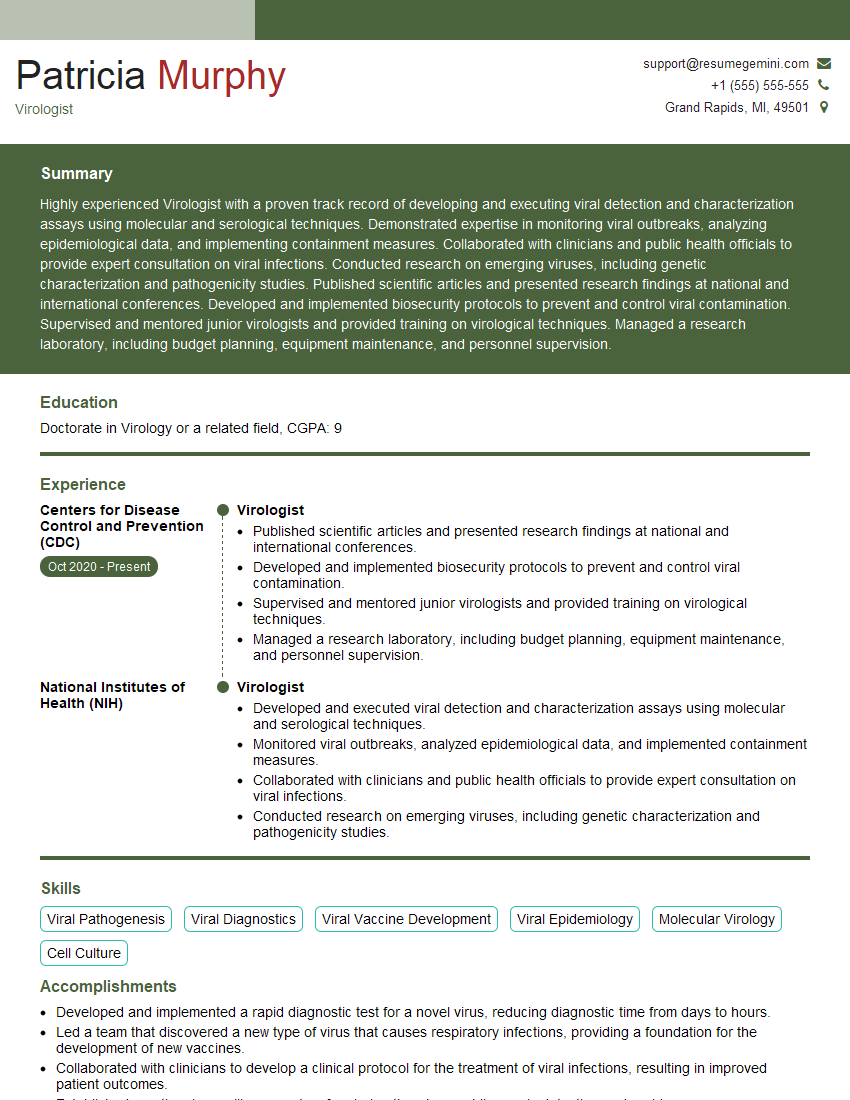Are you a seasoned Virologist seeking a new career path? Discover our professionally built Virologist Resume Template. This time-saving tool provides a solid foundation for your job search. Simply click “Edit Resume” to customize it with your unique experiences and achievements. Customize fonts and colors to match your personal style and increase your chances of landing your dream job. Explore more Resume Templates for additional options.

Patricia Murphy
Virologist
Summary
Highly experienced Virologist with a proven track record of developing and executing viral detection and characterization assays using molecular and serological techniques. Demonstrated expertise in monitoring viral outbreaks, analyzing epidemiological data, and implementing containment measures. Collaborated with clinicians and public health officials to provide expert consultation on viral infections. Conducted research on emerging viruses, including genetic characterization and pathogenicity studies. Published scientific articles and presented research findings at national and international conferences. Developed and implemented biosecurity protocols to prevent and control viral contamination. Supervised and mentored junior virologists and provided training on virological techniques. Managed a research laboratory, including budget planning, equipment maintenance, and personnel supervision.
Education
Doctorate in Virology or a related field
September 2016
Skills
- Viral Pathogenesis
- Viral Diagnostics
- Viral Vaccine Development
- Viral Epidemiology
- Molecular Virology
- Cell Culture
Work Experience
Virologist
- Published scientific articles and presented research findings at national and international conferences.
- Developed and implemented biosecurity protocols to prevent and control viral contamination.
- Supervised and mentored junior virologists and provided training on virological techniques.
- Managed a research laboratory, including budget planning, equipment maintenance, and personnel supervision.
Virologist
- Developed and executed viral detection and characterization assays using molecular and serological techniques.
- Monitored viral outbreaks, analyzed epidemiological data, and implemented containment measures.
- Collaborated with clinicians and public health officials to provide expert consultation on viral infections.
- Conducted research on emerging viruses, including genetic characterization and pathogenicity studies.
Accomplishments
- Developed and implemented a rapid diagnostic test for a novel virus, reducing diagnostic time from days to hours.
- Led a team that discovered a new type of virus that causes respiratory infections, providing a foundation for the development of new vaccines.
- Collaborated with clinicians to develop a clinical protocol for the treatment of viral infections, resulting in improved patient outcomes.
- Established a national surveillance system for viral outbreaks, enabling early detection and rapid response.
- Developed a novel method for purifying viruses, significantly improving the accuracy and sensitivity of diagnostic tests.
Awards
- Received a National Institutes of Health grant to study the molecular epidemiology of emerging viral pathogens.
- Awarded the American Society for Microbiology Young Investigator Award for research on the development of novel antiviral therapies.
- Recognized with the Centers for Disease Control and Preventions Outstanding Investigator Award for contributions to the field of viral diagnostics.
Certificates
- Certified Virologist (CV)
- Diplomate of the American Board of Virology (ABV)
- Certified Laboratory Professional (CLP)
- Registered Medical Laboratory Scientist (MLS)
Career Expert Tips:
- Select the ideal resume template to showcase your professional experience effectively.
- Master the art of resume writing to highlight your unique qualifications and achievements.
- Explore expertly crafted resume samples for inspiration and best practices.
- Build your best resume for free this new year with ResumeGemini. Enjoy exclusive discounts on ATS optimized resume templates.
How To Write Resume For Virologist
- Highlight your expertise in viral detection and characterization techniques in your resume
- Showcase your experience in monitoring viral outbreaks and implementing containment measures
- Quantify your accomplishments in research on emerging viruses, such as the number of publications or grants received
- Emphasize your ability to communicate complex scientific information to clinicians and public health officials
Essential Experience Highlights for a Strong Virologist Resume
- Develop and execute viral detection and characterization assays using molecular and serological techniques
- Monitor viral outbreaks, analyze epidemiological data, and implement containment measures
- Collaborate with clinicians and public health officials to provide expert consultation on viral infections
- Conduct research on emerging viruses, including genetic characterization and pathogenicity studies
- Publish scientific articles and present research findings at national and international conferences
- Develop and implement biosecurity protocols to prevent and control viral contamination
- Supervise and mentor junior virologists and provide training on virological techniques
Frequently Asked Questions (FAQ’s) For Virologist
What is the role of a Virologist?
A Virologist is a scientist who studies viruses, including their structure, function, and evolution. Virologists also study the interactions between viruses and their hosts, including humans, animals, and plants. They use this knowledge to develop diagnostic tests, vaccines, and treatments for viral infections.
What are the educational requirements to become a Virologist?
Most Virologists have a doctorate in virology or a related field, such as microbiology or molecular biology. Some Virologists also have a medical degree.
What are the career prospects for Virologists?
Virologists can work in a variety of settings, including academia, government, and industry. They can conduct research, develop new diagnostic tests and treatments, or work in public health. Virologists can also work as science writers or educators.
What are the challenges facing Virologists?
Virologists face a number of challenges, including the emergence of new and unknown viruses, the development of drug-resistant viruses, and the need to develop new vaccines and treatments for viral infections.
What are the rewards of being a Virologist?
Virologists have the opportunity to make a real difference in the world by helping to prevent and treat viral infections. They also have the opportunity to conduct cutting-edge research and to learn about the fundamental nature of viruses.